|
|
|
Sort Order |
|
|
|
Items / Page
|
|
|
|
|
|
|
| Srl | Item |
| 1 |
ID:
152958


|
|
|
|
|
| Summary/Abstract |
This issue of Small Wars and Insurgencies focuses on the continuing importance of Maoist and post-Maoist concepts of people’s war. It has assembled a collection of papers that addresses various examples from around the world, with an emphasis on South America, where the premier illustration, that of Colombia’s FARC, was Marxist-Leninist but not Maoist, yet embraced the form and strategy of people’s war in a bid which at one point had the state in a critical situation. The collection comes in the wake of previous papers published in this journal on politically Maoist insurgent movements in South Asia, notably Mika Kerttuenen’s study of Maoist insurgents in Nepal and Prem Mahadevan’s survey of Maoist insurgencies in India and their links to organized crime (Kerttunen, “A Transformed Insurgency,” 78–118; Mahadevan, “The Maoist Insurgency in India,” 203–20). The papers confirm that people’s war remains an important analytical framework in the study of small wars and insurgencies, for some even a ‘model’ through which to understand distinct types of insurgent movements and their strategies.
|
|
|
|
|
|
|
|
|
|
|
|
|
|
|
|
| 2 |
ID:
119146
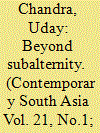

|
|
|
|
|
| Publication |
2013.
|
| Summary/Abstract |
Subalterns, as Ranajit Guha famously argued, resist modern states on the basis of pre-existing social solidarities and an autonomous domain of consciousness. Critics of subaltern studies have argued, however, that subaltern resistance is, in fact, deeply implicated in the symbols and discourses of domination rather than simply constituting an autonomous political domain. Might it be possible to take this criticism of subalternity seriously and yet appreciate the complex ways in which adivasi subjects in contemporary India resist and negotiate their subjecthood? Can we, then, locate resistance in the process of negotiating states? Focusing on the eastern Indian state of Jharkhand, this paper takes up this challenge by probing into the tropes and strategies by which the contradictory mechanisms and meanings of modern state power have been reworked and resisted in two apparently opposed moments of resistance: the 'peaceful' Koel-Karo anti-dam movement of the 1980s and the ongoing 'violent' Maoist movement. In doing so, I show how land and community are intertwined inextricably in recent adivasi resistance such that the notion of 'community' underpins both territorial claims on the post-colonial state by Munda men and women and efforts to remake political selves in dialogue with statist discourses of primitivism.
|
|
|
|
|
|
|
|
|
|
|
|
|
|
|
|
| 3 |
ID:
150798
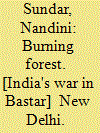

|
|
|
|
|
| Publication |
New Delhi, Juggernaut Books, 2016.
|
| Description |
xv, 413p.:mapshbk
|
| Standard Number |
9789386228000
|
|
|
|
|
|
|
|
|
|
|
|
Copies: C:1/I:0,R:0,Q:0
Circulation
| Accession# | Call# | Current Location | Status | Policy | Location |
| 058939 | 320.5320954/SUN 058939 | Main | On Shelf | General | |
|
|
|
|
| 4 |
ID:
140246
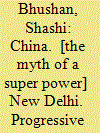

|
|
|
|
|
| Publication |
New Delhi, Progressive People's Sector Publications (p) Ltd., 1976.
|
| Description |
216p.hbk
|
|
|
|
|
|
|
|
|
|
|
|
Copies: C:1/I:0,R:0,Q:0
Circulation
| Accession# | Call# | Current Location | Status | Policy | Location |
| 029472 | 951.058/SHA 029472 | Main | On Shelf | General | |
|
|
|
|
| 5 |
ID:
184395
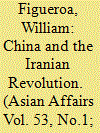

|
|
|
|
|
| Summary/Abstract |
This article examines several under-explored aspects of Sino-Iranian relations in the 1970s, the process of Sino-Iranian rapprochement, and China's reaction to the 1979 revolution. By relying on sources in both Chinese and Persian and pushing back the timeline to 1965, it analyses the role of China's unofficial support for Iranian Maoism on official relations, the personal role of the Shah and the women of the royal family, China's internal view of the Islamic Republic shortly after 1979, and the role of propaganda and performativity in Sino-Iranian diplomacy. In doing so, it sheds new light on old topics and expands on previous studies that focus primarily on the official politics of rapprochement and the post-1971 era.
|
|
|
|
|
|
|
|
|
|
|
|
|
|
|
|
| 6 |
ID:
153206
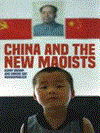

|
|
|
|
|
| Publication |
London, Zed Books, 2016.
|
| Description |
ix, 190p.pbk
|
| Standard Number |
9781783607594
|
|
|
|
|
|
|
|
|
|
|
|
Copies: C:1/I:0,R:0,Q:0
Circulation
| Accession# | Call# | Current Location | Status | Policy | Location |
| 059101 | 363.32517/BRO 059101 | Main | On Shelf | General | |
|
|
|
|
| 7 |
ID:
036901
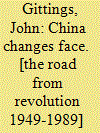

|
|
|
|
|
| Publication |
Oxford, Oxford University Press, 1989.
|
| Description |
xiv, 290p.hbk
|
| Standard Number |
0192158872
|
|
|
|
|
|
|
|
|
|
|
|
Copies: C:1/I:0,R:0,Q:0
Circulation
| Accession# | Call# | Current Location | Status | Policy | Location |
| 030799 | 951.05/GIT 030799 | Main | On Shelf | General | |
|
|
|
|
| 8 |
ID:
188066
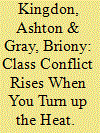

|
|
|
|
|
| Summary/Abstract |
The increasing impacts of climate change have created a global humanitarian crisis. Growing populations, unstable political structures, and competition over scarce resources are generating unprecedented levels of insecurity. Capitalising on these complex situations, terrorist organisations are using the environment as a weapon of war, exploiting the strains and grievances exacerbated by climate change to increase support, aid recruitment, and incite violence. Often neglected within contemporary analyses is the potential impact of anthropogenic climate change on left-wing terrorist organisations. Consequently, the research presented in this paper takes an interdisciplinary approach, combining terrorism studies with disaster management to examine a specific type of security crisis that exists in this overlapping relationship between climate change and left-wing conflict. Three regional case studies of terrorist groups and activity are examined in detail—the Revolutionary Armed Forces of Colombia, the Shining Path in Peru, and Naxalites in India. The article reveals the complex issues that underlie climate disasters, focusing on the impact hazards such as deforestation, rising sea levels, extreme weather, glacial retreat, drought, famine, water scarcity, and migration have on left-wing terrorist recruitment and activity.
|
|
|
|
|
|
|
|
|
|
|
|
|
|
|
|
| 9 |
ID:
184626
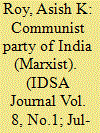

|
|
|
| 10 |
ID:
148765
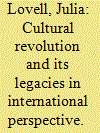

|
|
|
|
|
| Summary/Abstract |
This article explores the rhetoric and reality of the Cultural Revolution as an international phenomenon, examining (through published and oral histories) the ways in which it was perceived and interpreted beyond China. It focuses in particular on the diverse impact of Maoist ideas and practice on the counterculture movement of Western Europe and North America during the late 1960s and 1970s. Within Europe, Cultural Revolution Maoism galvanized Dadaist student protest, nurtured feminist and gay rights activism, and legitimized urban guerrilla terrorism. In the United States, meanwhile, it bolstered a broad programme of anti-racist civil rights campaigns and narrow Marxist-Leninist party-building. Despite Mao's hopes to launch a global permanent revolution, it appears that, over the long term, enthusiasm for the Cultural Revolution in Western Europe, the United States and parts of South-East Asia helped to splinter the radical left and assisted the right in consolidating its power throughout the 1980s and beyond.
|
|
|
|
|
|
|
|
|
|
|
|
|
|
|
|
| 11 |
ID:
148769
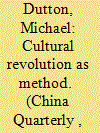

|
|
|
|
|
| Summary/Abstract |
This paper treats the Chinese Cultural Revolution as a means by which to open on to a more affective approach to the question of the political. It examines one piece of art-technology of that period and shows the way it intuitively worked within the fluidity of power to produce political intensity. This one technology is a microcosm of the Cultural Revolution notion of the political that was built around an attempt to channel and harness affective power towards revolutionary ends. Both because it attempts to direct the political through the affective dimension and because its methods of doing so resembled contemporary art practices, this paper opens on to the possibilities of a method based on an art rather than a science of the political.
|
|
|
|
|
|
|
|
|
|
|
|
|
|
|
|
| 12 |
ID:
165242
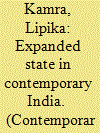

|
|
|
|
|
| Summary/Abstract |
This paper explores the ‘expanded state’ in post-liberalisation India within the context of official responses to the Maoist insurgency in rural central and eastern India. I analyse a scheme called the Prime Minister’s Rural Development Fellowship, which was launched as part of the central government’s attempt to wean ordinary men and women away from Maoist insurgents through rural development. Under this scheme, young women and men are appointed to assist state officials in implementing rural development programmes in districts classified as ‘Left-Wing Extremist’. What does the institution and practice of this fellowship tell us about the state in India today in the context of counterinsurgency and beyond? I address this question on the basis of ethnographic fieldwork in an erstwhile Maoist district in the eastern Indian state of West Bengal. By closely shadowing the everyday work of one Prime Minister’s Rural Development Fellow (PMRDF), I show how the PMRDF is located outside the state, and yet constitutes the state. By focussing on the role of the PMRDF, I reveal one of the many new configurations of the state that are emerging in India today.
|
|
|
|
|
|
|
|
|
|
|
|
|
|
|
|
| 13 |
ID:
161707
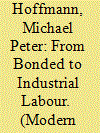

|
|
|
|
|
| Summary/Abstract |
This article focuses on how people who formerly worked as bonded labourers adapt to the new realities of an insecure capitalist labour market. It examines how the past shapes the uncertain labour situation of the present, including resistance. The article reflects on the current experiences of precarious labour at industrial sites in western Nepal. It describes how former bonded labourers and their descendants have begun working as contract workers in a modern industrial food-processing factory, with the help of contractors related to them by kin. The article further shows that one of the defining features of their new life as contract labourers is its chronic precariousness. Undisguised forms of confrontation, such as open disregard for management instructions, are also part of their new reality in the labour market. Contract labourers are often strongly assertive in the face of managerial authority, and this assertiveness has been shaped largely by either past experiences or memories of bonded labour. The article contributes to debates about bonded labour and its transformations in South Asia. It also offers a reflection on the limited impact of the Nepali Maoist Revolution on precarious labour and on the ethnic dimensions of this segment of Nepali society. Finally, it contributes to discussions about industrialization and Adivasi communities in South Asia and beyond.
|
|
|
|
|
|
|
|
|
|
|
|
|
|
|
|
| 14 |
ID:
072733
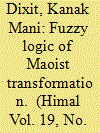

|
|
|
| 15 |
ID:
054675
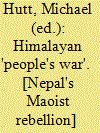

|
|
|
|
|
| Publication |
London, Hurst and Company, 2004.
|
| Description |
xi, 322p.pbk
|
| Standard Number |
185065722X
|
|
|
|
|
|
|
|
|
|
|
|
Copies: C:1/I:0,R:0,Q:0
Circulation
| Accession# | Call# | Current Location | Status | Policy | Location |
| 048858 | 954.96/HUT 048858 | Main | On Shelf | General | |
|
|
|
|
| 16 |
ID:
110047
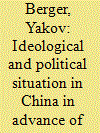

|
|
|
|
|
| Publication |
2011.
|
| Summary/Abstract |
As the 18th congress of the CPC, which is supposed to renovate the leadership of the ruling party and adopt programmatic directives on the crucial questions of the country's development for the period up to 2020, is drawing closer, a dialogue and confrontation between various ideological and political groups (both between themselves and with central power and various groupings within it) tend to intensify. The left-wing forces and their liberal or social-democratic opponents take an active part in rivalry.
|
|
|
|
|
|
|
|
|
|
|
|
|
|
|
|
| 17 |
ID:
149061
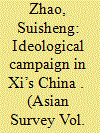

|
|
|
|
|
| Summary/Abstract |
President Xi Jinping has launched the largest ideological campaign in post-Mao China, which has brought a Maoist revival. But Xi is not in a position to make a full return to the Mao era because ideologically driven repression offers no long-run solution to China’s problems. Drawing on elements of Mao’s legacy, Xi aims to rebuild the regime’s legitimacy when it is increasingly vulnerable to economic slowdown and public anger about corruption, income disparity, and pollution, an embarrassing confession of regime fragility.
|
|
|
|
|
|
|
|
|
|
|
|
|
|
|
|
| 18 |
ID:
128928
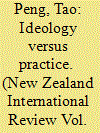

|
|
|
| 19 |
ID:
122035
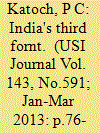

|
|
|
| 20 |
ID:
113568
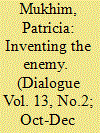

|
|
|
|
|
|
|
|